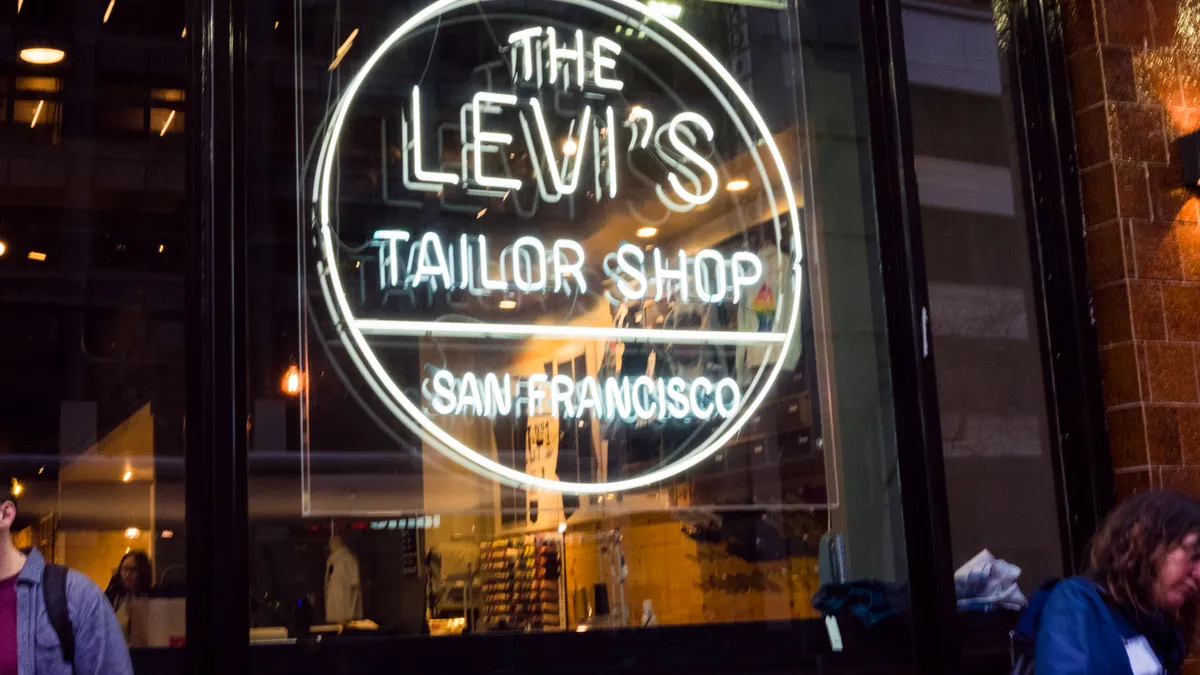Dive Brief:
-
Levi Strauss & Co., in its first report since becoming a publicly traded company last month, said that first quarter net revenue rose 6.8% or 10.7% on a constant-currency basis. In the Americas, its largest trading region, net revenue rose 9%, while its direct-to-consumer revenues — including e-commerce and stores — rose 10%. Wholesale revenue grew 5%, "reflecting growth in all regions," according to a company press release. As of quarter's end, the company ran 70 more of its own stores year over year.
-
The denim apparel retailer swung to a profit in the quarter, with net income increasing by $166 million (thanks largely to tax reform) to $146.5 million, from the $18.6 million loss of the year-ago quarter. Adjusted net income rose 81% to $151 million from $83 million a year ago, and adjusted earnings before interest and taxes rose 14% to $206 million from $180 million a year ago, the company said.
-
Net debt at the end of the first quarter stood at $319.2 million, according to the release. That's down from $497 million last year, CFO Harmit Singh said on the company's conference call, according to a transcript from Seeking Alpha.
Dive Insight:
On the company's conference call with analysts on Tuesday, its first in a while, CEO Chip Bergh promised that its momentum would continue.
"The strong results we delivered this quarter demonstrate that the strategic choices that we put in place seven years ago to drive the profitable core expand for more, become a world-class omni-channel retailer, and achieve operational excellence continue to pay off with broad-based growth balanced across a more diversified portfolio," he said.
Levi's expanded both its top and bottom lines in the quarter, despite being faced with the tough comparison to a strong quarter a year ago, when it was still a private company. The company is backing up its long view with strategies to go beyond traditional retail channels, with its own stores and assertive moves into e-commerce, and its core denim offer.
"Taking control over distribution in this way is a critical component of future success — especially given the issues with third-parties such as department stores," GlobalData Retail Managing Director Neil Saunders said in comments emailed to Retail Dive. "These more traditional routes to market simply cannot be relied upon to sustain wholesale revenue growth over the medium to longer term."
More than simply expanding beyond denim, though, the company has successfully begun to orient itself as a lifestyle brand that appeals to younger customers. That positions them well against rival Kontoor, the denim company comprising Wrangler and Lee spun off from VF Corp., according to Jane Hali & Associates analysts, who in an email to Retail Dive pointed to the brand's recent tie-up with Hailey Bieber, who has 19 million social media followers. Jane Hali analysts also said they're impressed with the brand's performance in wholesale, gross margin (54.6%), and growth in men's, women's and total tops and bottoms.
Saunders also said that having its own stores and direct-to-consumer operations will continue to help drive all that. "This is something that the company can tap into with a more varied range of items," he noted. "This counterbalance to denim, which is already well underway, is an important insurance policy against the vagaries of the fashion market where denim could, at some point in the future, fall out of favor."
But Levi's, perhaps unsurprisingly, is not exactly forfeiting its storied place in denim, either. The company is adding more jeans customization and employing performance denim fabrics with temperature control and stretch. "There is no doubt that Levi's does a far better job of explaining and merchandising such innovations than most other stores which stock and sell its brand, which allows it to push more volume and maintain higher premium price points," Saunders said.
Not all is smooth, however. Currency headwinds promise to continue to challenge the company's bottom line, and its debt could become a worry, according to Saunders. "The one area of financial concern is Levi's debt load, with long term debt still topping a billion dollars," he warned. "This resulted in an interest expense of over $200 million this quarter — a level that while manageable, is uncomfortable. However, we are satisfied with the progress made in paying down these liabilities, and in the cash the company is generating; as such, we believe that Levi's performance will allow it to make further progress on debt as it moves to capital repayment in 2025 and 2027. Overall, this is a good set of numbers which are underpinned by a sound strategy and growing brand affinity."














